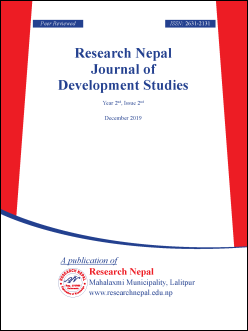Influence of Buddhism and Vedism in Nepalese Co-operatives
DOI:
https://doi.org/10.3126/rnjds.v2i2.29269Keywords:
Buddhism, Nepalese Co-operatives, VedismAbstract
The universal definition of co-operatives is an autonomous association of persons united voluntarily to meet their common economic, social, and cultural needs and aspirations through a jointly-owned and democratically-controlled enterprise. Co-operatives are the community based member oriented and controlled organizations. It based on values of self-help, self-responsibility, equality, equity, democracy and solidarity. Empowerment, reinvesting and upliftment in economic status of people are the main purpose of co-operatives. The main objective of the study is to investigate how co-operatives can act as agents towards sustainable community development and economic development of Nepal through Vedic and Buddhism perspective. Methodologically, it is a comprehensive interpretive analysis through literature review. In conclusion Nepalese co-operatives do not have impacts or influences of godly philosophies neither Vedism nor Buddhism.
Downloads
Downloads
Published
How to Cite
Issue
Section
License
© Research Nepal
Authors will be required to transfer their copyright to Research Nepal.




